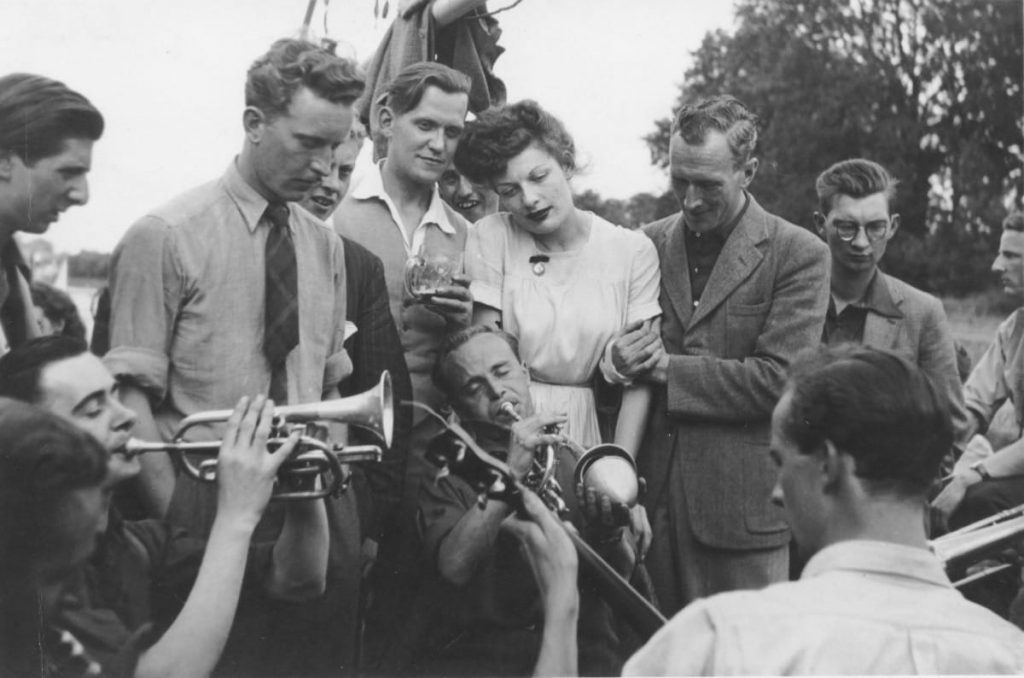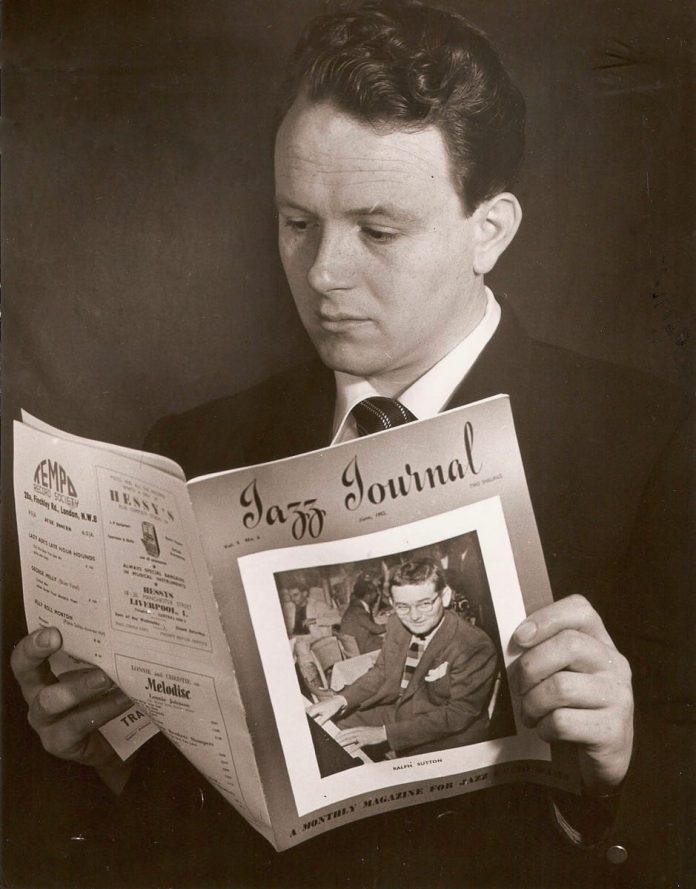Manchester had a myriad of trad bands, and the best of them, the Saints Jazz Band, was shoved into that category. They harboured a banjo. although it didn’t seem necessary, for they played a boisterous Dixieland that swung quite well – the banjo was never in the business of swinging. The Saints were very much a one-record band, since they rode on the success of their performance at the Festival Hall concert of the lively I Want A Girl Just Like The Girl That Married Dear Old Dad (the theme song from Oedipus Rex). The record still sounds good today, and rightly became something of a national success, although the band’s routine repertoire meant it was unable to follow up. Alan Radcliffe, the clarinettist, was the outstanding player, in much the way that Don Lydiatt, with his inspiring Ed Hall style, dominated the Merseysippi Jazz Band. The Saints’s solos on their over-five minutes 78 were all perfectly formed, with even the usually pedestrian cornettist Mike McNama excelling himself.
Looking for a pee after his final ride. the only toilet he could find open was the ladies. “I never knew until that night that the graffiti in the ladies was even filthier than it was in the gents.”
On one occasion when McNama was absent, the Saints called up a friend of mine, trumpeter John Higham from St Helens, as a dep for a gig in Shrewsbury, 90 miles away. The gig went well and, some time after 11, when the crowd left, the chap who was paying him said “The band isn’t going back to Manchester. We’re going straight to London for some gigs. Here’s five quid. Get yourself home.”
He didn’t suggest how, and John realised that his only way back to St Helens was to hitch-hike through the night. He did this and was eventually dropped in Birkenhead in the early hours, still very much in the dark and many miles from home. Looking for a pee after his final ride. the only toilet he could find open was the ladies. “I never knew until that night that the graffiti in the ladies was even filthier than it was in the gents.” (Allow me to shoehorn in a graffiti that Danny Moss and Bobby Lamb discovered in a gents: “Don’t Cry For Me, Accrington Stanley.”).
As daylight broke, John was able to get a bus through the Mersey Tunnel and from there eventually another one to St Helens, where he arrived later that morning, with the Saints’ five quid still intact.
The singer Clinton Ford had a magnificent repertoire of old-fashioned songs that lent themselves splendidly to traditional jazz. He and his band had been playing in Yorkshire and, on their trip back over the Pennines, the musicians in the band needed relief. They stopped in the pitch blackness and at one point Clint took a step forward and crashed down a 20-foot drop. He lay moaning in the darkness and, although the band could hear him, they had no idea where he was. Fortunately he had a newspaper, which he tore into pieces and lit to guide the men down the cliff to their injured leader.
Having been drawn to the music by banjo-impelled bands, the less unsophisticated trad fans were happy to extend their enthusiasm to accept and relish bands like Louis Armstrong’s All Stars and the Condon mob, both obviously more gifted and tasteful than the newer young bands, the latter having undeniable energy as their main quality.
Condon/Armstrong styles were lumped together as Dixieland, and the name also covered a small group of British bands who had more musical ability than the traddies. It included the bands of the aforementioned virtuoso trumpeter Freddy Randall, drummer Joe Daniels, who had led the way with commercial Dixieland during the 30s, and trombonist Bobby Mickleburgh. Randall had several fine musicians, including the trombonist Geoff Sowden and clarinettists Bruce Turner and Dave Shepherd, whilst Joe Daniels discovered in his own older generation the fine trumpeter Alan Whickam, who enjoyed a happy resurgence. Joe occasionally drew in “commercial” Dixielanders like George Chisholm, Don Lusher and Henry McKenzie. Daniels’s concerts were of a far higher quality than his contemporary Parlophone record output.
Everyone agreed that the exquisite clarinettist Edmond Hall was a most delightful man, so gentle in nature that he won’t mind being dragged into a piece on revivalism, though in truth he was one of the early originators of jazz in New Orleans. He was with Louis Armstrong’s All Stars when they embarked on a tour lasting several months that shared its bill with the Woody Herman Band. While the All Stars had the best hotels pre-booked for them throughout the tour, the Herman band had to scuffle each night to find somewhere to stay.
Edmond struck up a friendship with Herman trombonist Bobby Lamb, and he noticed Bobby’s nightly foraging.
“I like to move on each night to the town of the next concert”, Ed told Bobby, “so my room in a first-class hotel is empty for nearly all of the night. Why don’t you move in to my rooms after I’ve gone?” Bobby roped in a couple of the others from Woody’s band when he took Ed up on this and thus they had first-class accommodation for the rest of the tour, three of them sharing Edmond’s newly vacated rooms.
There’s a name for the practice of musicians using other people’s rooms like this and it’s “ghosting”. Staying away from the revival for a moment, the finest example I know of ghosting is as follows.
The Herman band played in Atlantic City on a night when there was a navy festival in the city and virtually every room was booked up. But one of the Herman men had managed to get a room. At the end of the night, after their concert, 14 members of Woody’s band collected in the single room and, with difficulty, laid themselves down on the floor to sleep. One of them, who was drunk, rang the night porter for a sandwich and a beer. When the porter arrived with the order, he opened the door and tiptoed gently across the sleeping rows on the floor, delivered the beer and the sandwich, and then quietly tiptoed out again.
It was customary for night porters and hotel staff to make no comment or take no action on the multitude of irregular nocturnal situations like this that they found.
Back in England trad proliferated at an amazing pace as newly developed forms of dancing multiplied and swamped the original audience of record devotees. The dancing aspect of the music had been brought to these shores by the Graeme Bell Band from Australia. Although it used the line-up and musical forms that were to become trad, the musicians had a more liberal and sophisticated attitude to the music. Their visit to Britain in 1947 introduced to us the Australian idea of dancing to the music, and the result was a huge upheaval as trad bands picked up on it and began playing dance halls, where conventional forms of the dance, the fox-trot and waltz were swept aside to their doom. Watching from the bandstand and observing the agility at this art of George Melly, whom he had then not met, Humph christened the unknown wriggler “Bunny Bum”.
The Bells’s music was not static, and by the time they returned to Britain in 1951 it showed great originality and high standards. This made the immediate alliance with Humphrey Lyttelton’s band a most welcome and refreshing development that reached new high-water marks in British jazz.
Even in the best bands like Humphrey Lyttelton’s and the first Barber band, the banjo was talisman from the early days on.

Reviewing an early George Webb record in 1946, before the banjo was, to coin a phrase, set in stone, Stanley Dance was remarkably prescient. Lambasting Lu Watters’s clarinettist and praising Wally Fawkes in comparison, he saw the tuba as “a silly affectation”.
“The thing that does please me about records like this, and by Lu Watters, is that young musicians should take pleasure in this lusty old-style. The fact of their enjoyment is the greatest possible justification for the music resulting. I can imagine, too, that there is pleasure listening to them in the flesh. At the same time their performance should not be compared with masterpieces of the genre, the records by the Hot Five, Oliver, Dodds and the current Kid Ory-Omer Simeon combination. In that way some sense of perspective would be acquired and some abatement in the current hysteria achieved.”
The revival really got under weigh with the 50s and the early tsunami of bands included Mulligan and Melly, the Crane River Jazz Band, the Merseysippi Jazz Band, Mike Daniels’s Delta Jazz Band, Eric Silk and Mick Gill.
Today the evangelistic element is no more, and traditional bands are more efficient if not very ambitious about moving forward. They have higher standards now, and of course frequently draw their material from outside the New Orleans city boundaries. Stanley put his finger on it.
“The fact of their enjoyment is the greatest possible justification for the music resulting.”
If only they could find an aerosol to spray banjoists with.
















